
George Simon Kaufman was an American playwright, theater director and producer, humorist, and drama critic. In addition to comedies and political satire, he wrote several musicals for the Marx Brothers and others. He won the Pulitzer Prize for Drama for the musical Of Thee I Sing in 1932, and won again in 1937 for the play You Can't Take It with You. He also won the Tony Award for Best Director in 1951 for the musical Guys and Dolls.

Anna Christie is a play in four acts by Eugene O'Neill. It made its Broadway debut at the Vanderbilt Theatre on November 2, 1921. O'Neill received the 1922 Pulitzer Prize for Drama for this work. According to historian Paul Avrich the original of Anna Christie was Christine Ell, an anarchist cook in Greenwich Village, who was the lover of Edward Mylius the English radical who libeled the British king George V.

June Havoc was a Canadian American actress, dancer, stage director and memoirist.
Bronisław Kaper was a Polish film composer who scored films and musical theater in Germany, France, and the USA. The American immigration authorities misspelled his name as Bronislau Kaper. He was also variously credited as Bronislaw Kaper, Bronislaw Kapper, Benjamin Kapper, and Edward Kane.

Hubert Robert Harry Gregg was a British broadcaster, writer and actor. In his later years, he was known for the BBC Radio 2 "oldies" shows A Square Deal and Thanks for the Memory. He was also a novelist, theatre director and hit songwriter.

Robert Russell Bennett was an American composer and arranger, best known for his orchestration of many well-known Broadway and Hollywood musicals by other composers such as Irving Berlin, George Gershwin, Jerome Kern, Cole Porter, and Richard Rodgers.
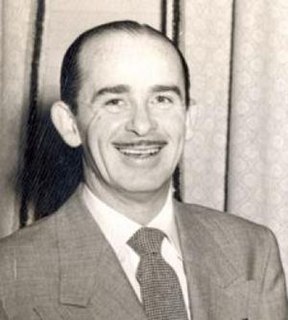
Ned Washington was an American lyricist born in Scranton, Pennsylvania.

Laurence Naismith was an English actor. He made numerous film and television appearances, including starring roles in the musical films Scrooge (1970) and the children's ghost film The Amazing Mr Blunden (1972). He also had memorable roles as Captain Edward Smith of the RMS Titanic in A Night to Remember (1958), the First Sea Lord in Sink the Bismarck! (1960), and Argus in Jason and the Argonauts (1963).

Joseph Herman Pasternak was a Hungarian-American film producer in Hollywood. Pasternak spent the Hollywood "Golden Age" of musicals at MGM Studios, producing many successful musicals with female singing stars like Deanna Durbin, Kathryn Grayson and Jane Powell, as well as swimmer/bathing beauty Esther Williams' films. He produced Judy Garland's final MGM film, Summer Stock, which was released in 1950, and some of Gene Kelly’s early breakthrough roles. Pasternak worked in the film industry for 45 years, from the later silent era until shortly past the end of the classical Hollywood cinema in the early 1960s.

Classical Hollywood cinema is a term used in film criticism to describe both a narrative and visual style of filmmaking which became characteristic of American cinema between the 1910s and the 1960s. It eventually became the most powerful and pervasive style of filmmaking worldwide. Similar or associated terms include classical Hollywood narrative, the Golden Age of Hollywood, Old Hollywood, and classical continuity.

William Henry Mettam "Robin" Bailey was an English actor. He was born in Hucknall, Nottinghamshire.

Hal Mohr, A.S.C. was a famed movie cinematographer. He is known for his Oscar-winning work on the 1935 film, A Midsummer Night's Dream. He was awarded another Oscar for his work on The Phantom of the Opera in 1943, and received a nomination for The Four Poster in 1952.
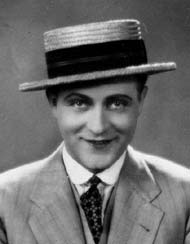
Willy Fritsch was a German theater and film actor, a popular leading man and character actor from the silent-film era to the early 1960s.
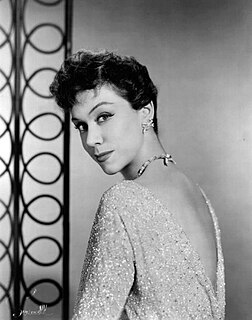
Patrice Munsel was an American coloratura soprano. Nicknamed "Princess Pat", she was the youngest singer ever to star at the Metropolitan Opera.
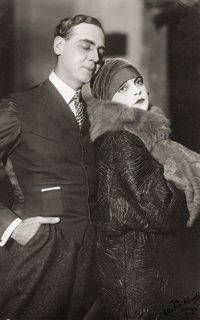
Hugo Björne was a Swedish film and theater actor.

Ian Fleming was an Australian character actor with credits in over 100 British films. One on his best known roles was playing Dr Watson in a series of Sherlock Holmes films of the 1930s opposite Arthur Wontner's Holmes.

His Excellency is a 1952 British comedy drama film directed by Robert Hamer and starring Eric Portman, Cecil Parker, Helen Cherry and Susan Stephen. It follows a blunt Yorkshireman and former trade union leader, who is sent to take over as Governor of a British-ruled island in the Mediterranean. It was based on the 1950 play of the same name by Dorothy Christie and Campbell Christie. The play was also filmed for Australian television in 1958.
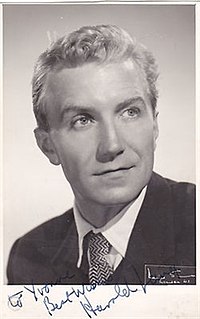
Harold Lang was a RADA-trained British character actor of stage and screen. During the 1950s, in particular, played many sly or menacing roles in B-films. At one time managed his own theatrical company. From 1960, Lang, a devotee of Stanislavski, also taught acting at Central School of Speech and Drama; and director John Schlesinger filmed his work in a documentary, The Class, for BBC TV's Monitor, in 1961.
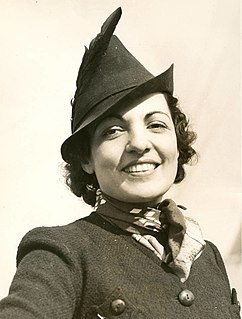
Colette D'Arville was a French soprano and musical theatre actress who had an international career in operas, concerts, and musicals from the 1920s through the 1940s. Beginning her career at the Théâtre des Bouffes-Parisiens from 1922 to 1927 with the stage name Colette Etchery, she changed her stage name to Colette D'Arville for her United States debut in the 1928 Broadway musical Here's Howe. She was active with the Opéra-Comique in Paris during the 1930s, and periodically appeared in operas with American companies from 1931 to 1942 in addition to performing on American radio and in concerts and recitals. She was particularly associated with the title role in Bizet's Carmen. While principally active in live performance on the stage and radio, she starred as Chichita in the 1935 musical film Tango Bar for Paramount Pictures. She was romantically involved with composer Deems Taylor and tenor Giovanni Martinelli.

















